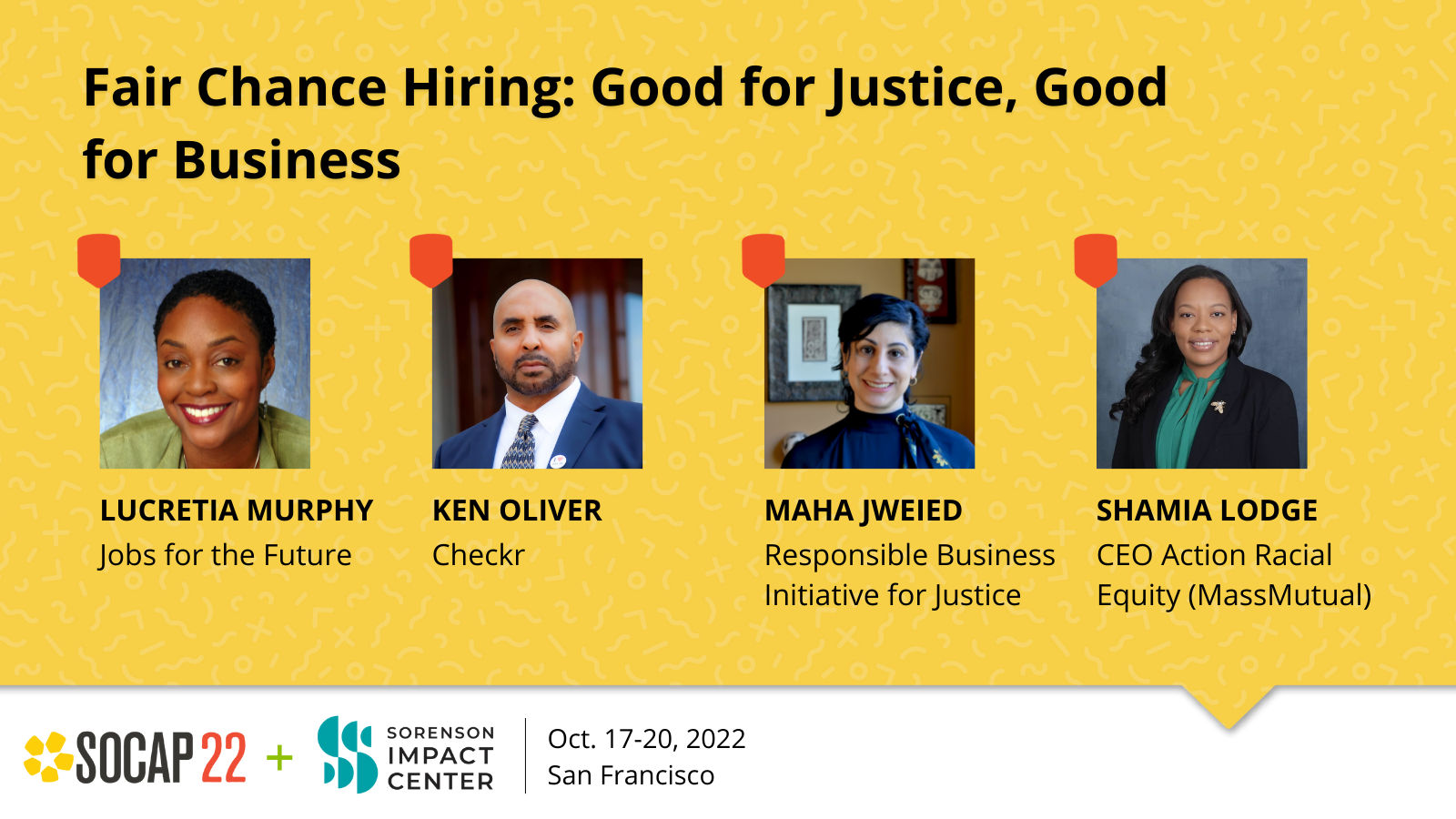Fair chance hiring — which excludes questions about job applicants’ criminal records — is gaining momentum as a way to advance justice and spark economic growth among advocacy organizations, business leaders, policymakers, and others. The potential for change is promising for the more than 70 million Americans with criminal records as well as businesses seeking to fill vacant positions, diversify their workforce, and strengthen their bottom line.
A SOCAP22 fireside chat-workshop, Fair Chance Hiring: Good for Justice, Good for Business, highlighted how corporations benefit when they play a more dynamic role in adopting fair chance hiring and, in turn, advancing economic mobility for people with records. Lucretia Murphy, Director of the Center for Justice and Economic Advancement at Jobs for the Future, said companies are exploring fair chance hiring and how it best fits their goals through talent development opportunities, entrepreneur and social impact ventures, policy and advocacy, and other methods.
“When businesses get involved in justice and when justice initiatives partner with business, they’re not two separate arms coming together. They’re everybody going in the same direction,” she said. “When fair chance hiring is implemented well, people aren’t only brought into a company, a company is accessing an enormous talent pool.”
That talent pool encompasses about a third of the workforce who historically have faced barriers to employment and other related opportunities such as housing, education, and social services, said Ken Oliver, Executive Director of Corporate Social Responsibility, Checkr. “The criminal justice system in America focuses on punishment rather than transformation. Usually, when you actually embrace people, you get a better result,” he said. “We have to think about different ways to access talent pipelines, and people with criminal records are a great source of workers and talent pools.”
Fair chance public policy, including Ban the Box laws and the Fair Chance Act, has numerous positive ripple effects including higher individual income and lower rates of recidivism, he said. “It’s really important from an equity standpoint to provide each and every person — whether they have a record or not — equal access to the American economy and to the middle-class economy, to help fuel decarceration and stop relying so much on punishment and really investing in people,” he said. “We’re asking employers not to lower the bar but to lower the barriers.”
One organization that aims to build corporate awareness of fair chance hiring is CEO Action for Racial Equity, an initiative from CEO Action for Diversity and Inclusion. Shamia Lodge of MassMutual is among the current participants in the two-year fellowship that was created in the wake of George Floyd’s murder and is helping corporate leaders learn more about the benefits of fair chance hiring.
“The movement in our country is saying we have to do more for this untapped talent,” she said. “Companies oftentimes know the what, they know the why, but they’re struggling to figure out the how.” Lodge said corporations can explore and support fair chance hiring in several ways, including direct and indirect hiring practices, philanthropic efforts, and advocacy on professional and personal levels.
Encouraging more corporations to use their influence through advocacy and leadership also is the focus at the Responsible Business Initiative for Justice, where Maha Jweid is Chief Strategy Officer. “We work with companies to champion fairness and equality in systems of incarceration and punishment,” she said.
This includes advocacy on the state and federal levels for criminal justice reform, Jweid said, such as clean slate policy, which automates arrest and conviction record clearance if a person stays crime-free for a period of time, and bail reform, which reduces the inherent bias against people with lower incomes. “There are a whole bunch of issues where the justice system intersects with people’s daily lives and impacts their ability to have a fair chance at supporting their families and their communities,” she said. “These policies link back to ESG, and how your businesses are impacting justice outcomes … and your stakeholders.”
Watch Fair Chance Hiring: Good for Justice, Good for Business
Speakers:
Maha Jweid, Chief Strategy Officer, Responsible Business Initiative for Justice
Shamia Lodge, Fellow, CEO Action for Diversity and Inclusion, MassMutual
Ken Oliver, Executive Director of Corporate Social Responsibility, Checkr
Lucretia Murphy, Director of the Center for Justice and Economic Advancement, Jobs for the Future







